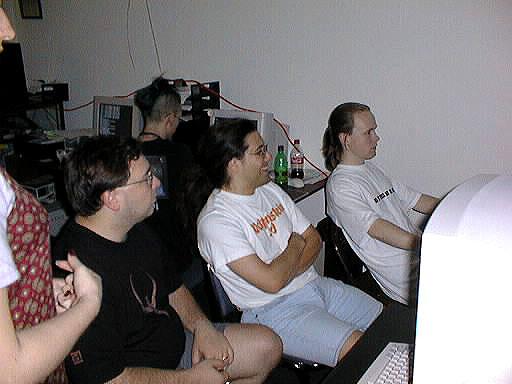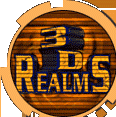The Apogee Legacy #19 - John Romero
 Anyone that knows our company should also know the name John Romero. If you don't know him, you haven't been paying attention. His name as been attached to some of the most notorius games in our industry's past. Both with us (Commander Keen & Wolfenstein 3D), and not with us (Doom, Quake, Daikatana).
Anyone that knows our company should also know the name John Romero. If you don't know him, you haven't been paying attention. His name as been attached to some of the most notorius games in our industry's past. Both with us (Commander Keen & Wolfenstein 3D), and not with us (Doom, Quake, Daikatana).
John has bounced around a bit since his id days. He's been involved with Ion Storm, Monkeystone, Majesco, Midway, amongst others. His name carries a lot of weight in our industry, so we were glad to have him participate in the series.
Enough of this lame introduction for someone who shouldn't need introducing anyway. :)
Past Pioneers of the Shareware Revolution
Issue #19 - John Romero
1) How did you first come in contact with Apogee?
Scott Miller had several of his games published through Big Blue Disk and had a monthly subscription to it. He saw one of my games, Pyramids of Egypt, on BBD and was really excited by it - seeing an opportunity for me to take the game, create additional levels, then publish it through Apogee Software.
Scott knew I worked at Softdisk and knew they filtered mail to make sure no one was trying to steal their programmers and artists. So he sent me about 4 letters in the mail, all of them pretending to be someone who played the game and wanted me to write them back for various reasons ("I think I found a bug, write me back!" or "Please write back - I'm 67 years old!"). The names were all different but the mailing address was the same on them all.
I didn't pick up on the duplicate mailing addresses until I was reading PC Games magazine and read an article about Scott and his Kroz games. At the end of the article was the address and I was thinking "I know that from somewhere. Where could it be from???" as my head slowly turned toward my wall where I had my prized fan mails. WTF!!??? I admit I went nuts. Mostly because my ego was instantly gibbed because I realized those weren't really fan mails they were just some guy trying to get me to contact him.
Well, I wrote Scott back and we got in touch and very quickly we settled on doing a trilogy of games for him titled "Commander Keen: Invasion of the Vorticons". We worked day and night for 3 months and Apogee released the trilogy on December 14, 1990. If you want more detail the book Masters of DOOM does a good job with this part of the story.
2) Was there a reason you decided to work with Apogee, say versus going on your own or working with another company?
Well I wasn't trying to moonlight while at Softdisk since I was really focused on my work there - Scott just provided an opportunity and I took it. Regarding why I didn't do a startup instead: before Softdisk I had already had two startup companies where I had about 17 published games between the both of them. I wanted a break from it for a little bit.

|
| John Romero, recent vintage |
3) Looking back, was there anything Apogee could have done better, regarding the marketing and distribution of your game?
Apogee did a wonderful job getting the game out in front of people. Software Creations was a great tool in that respect. It was probably the biggest and best BBS back then, run by Dan Linton.
Apogee could have done a better job with taking orders in the early 90's by using their income from Wolfenstein 3D and buying a networked order-taking system instead of the "stacks of paper" system where operators took the phone orders, wrote the info down then entered all the orders into a computer at the end of the day. We had a talk with Scott about this and gave him some time to implement it but he didn't - that's why we self-published DOOM.
4) Do you think your game was made better or worse by working with Apogee?
I don't remember getting much creative feedback from Apogee because we were fairly experienced at game design and development - we just finished the game and handed it over.
5) Apogee had a policy of letting the designer or studio retain full intellectual property rights to their game. Nowadays, it's rare to find a publisher who allows this, especially if the publisher is providing the funding. Do you believe that it's best for the creator to retain IP rights? Why or why not?
We wouldn't have signed a deal with Apogee back then if we couldn't have retained our IP. Besides, Apogee didn't pay for the development of our games - they gave us a $2,000 advance during Keen1-3 development but that was all for our entire relationship.
5a) And if applicable, have you benefited from retaining ownership of your own IP?
id Software definitely benefited from retaining ownership. If you look at the time period from 1990-2005 you'll see that the Keen and Wolf3D properties have had sequels and made money for id and Activision.

|
| John & Tom Hall during the Ion Storm days |
5b) Do you think there'll ever be a sequel to your game(s)?
Yes and there have been sequels made. I don't doubt more will be made in the future.
6) Is there any story/incident that stands out as interesting during your time associated with Apogee?
There are actually many fun stories about that time...but I'll bring one almost forgotten story up here.
I remember when I had discovered Raven Software in Madison, Wisconsin and gone over to meet with them and came back impressed with their team. I talked to the other 3 id guys and then Scott Miller (over the phone) and we both came up with a development budget that I could propose to Raven if they'd move over to PC game dev (they were Amiga guys) and license our Keen4-6 engine and make games for Apogee.
They declined the offer and one of their founders quit because he was upset with the decision.
Not 6 months later they had a deal for a PC game with EA and so we modified the Wolf3D tech and licensed it to them for Shadowcaster. Id saw no money from this engine license - the only time that had ever happened.
7) Apogee was an early pioneer in terms of teaming up with external designers and studios, and continues to do so even to this day (currently working with Human Head Studios on Prey). Why is it that so few other studios do this (mentor and fund outside projects with lesser known teams)?
Did you know that I helped Human Head Studios become a company? I gave them $250,000 so they could leave Raven, get an office, buy computers, etc. and start making a game for me using Unreal tech.
Actually, most big publishers find and publish outside projects all the time. In fact, they are always on the lookout for unknown teams with talent because the cost is much cheaper especially when the studios are outside the USA.
Much rarer is having a developer (not publisher) help other developers with their businesses and game designs because most developers are always struggling to stay alive. Id Software was one of the first to do this (Raven, Valve, Parallax, Rogue, Ritual).

|
| John at the Ion Storm Dallas offices. |
8) What the biggest difference in the industry nowadays versus when you worked with Apogee?
Well, the PC gaming industry is much more mature. We were there at the very beginning of when the hardware was just starting to be something you could do smooth scrolling and animation like console systems (with a lot of tricks and fancy coding).
Nowadays the gaming world is all 3D thanks to Wolf3D, DOOM and Quake. The world has definitely changed since those days, each of those games forever altering the course of 3D game development.
Quake brought the world into high-speed full 3D games then Quake II brought 3D acceleration and color; everything since then has been icing on the cake.
9) What have you been doing since your time with Apogee?
Games! I'm currently on my 7th startup company and I've returned to the PC from five years of mobile games and then console games. And now I'm developing in the genre that I consider the future of PC games - MMOG. If you want to know exactly what games I've been working on you can simply check my MobyGames profile.
10) If you're no longer making games, have you thought about returning to this industry? If not, why not?
N/A!!
11) Looking back, are there any missed opportunities that you wish you'd have jumped on?
The only opportunity that I'm aware of was when Paul Neurath asked me to join him as his first employee at Blue Sky Productions (later Looking Glass Technologies). I didn't take the offer because I had already planned on starting a company with my boss (Inside Out Software). If I had taken the offer at Blue Sky then an incredible amount of things would have been different. I'm glad I did what I did.
12) Other than your game(s), what's your favorite game released or produced by Apogee (or 3D Realms)?
Duke Nukem 3D, hands down - I love that game so much it's crazy. I actually listened to the music from Duke 3D for about 5 years every day while I worked....THAT'S how much I loved the game (and music). It was such a fully featured and well done game - and it was truly the very last of its breed when it was released just before Quake hit the scene.
12a) And what's your favorite 2-4 games released by anyone else?
My favorite OTHER games: Chrono Trigger, Resident Evil 4, World of Warcraft, Half Life 2.
13) Is there anything else you'd like to add about your time here or to fans of your title(s)?
If you're a fan, there's a lot of pages out on the net about the games! And if you want to know what I'm up to just check out http://rome.ro. Over and out!

id Software, circa 1992.
L-R: John Carmack, Kevin Cloud, Adrian Carmack, John Romero, Tom Hall, & Jay Wilbur.
More info on pic here.

L-R: Killcreek, RonSolo, Unknown (in background), Romero, & Tom Mustaine watching Tom play ROTT in 1995.
Of the games that John did with us, we still sell them all, so check out the links below. John is also a record holder with us - having the longest hair of any developer we've ever worked with. ;)
- Our History of Keen Page
- Our Keen Vorticons Catalog Page
- Our Keen Galaxy Catalog Page
- Our Wolfenstein 3D Catalog Page
- John Romero Page on Wikipedia
- John's Homepage
- John's a cartoon!
Make sure and tune in again next Monday morning, when we bring you the next in our Legacy Interview series.
Posted by Joe Siegler on May 15, 2006 at 4:51 PM | Permalink
| Discuss this story on our forums
News Categories: About 3DR / 3DR Staff | The Apogee Legacy






